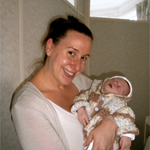Pinpointing how acupuncture can help with male fertility
Fertility issues are nothing new. According to a 2019 report, around 48.5 million couples experience infertility worldwide – with 1 in 7 couples in the UK unable to have a child.
But when it comes to difficulties with getting pregnant, the onus is quite often placed on the woman. When in fact, as stated by The British Association of Urological Surgeons, for 50% of couples unable to fall pregnant, the problem lies wholly or partly with the male partner.
“It’s been estimated that low sperm counts in men have tripled from 6% to 18% since the 1940s,” trained Osteopath Denise Callaghan says.
Falling pregnant with acupuncture
Denise, who has more than 20 years’ experience in the industry, is well versed in the business of fertility woes. She has worked with hundreds of couples who are struggling to conceive naturally, using acupuncture to help them fall pregnant.
Denise initially travelled to China to learn Acupuncture, which is its birthplace, and then honed her studies with the renowned Zita West fertility clinic in London. She is now furthering her knowledge around fertility and associated issues, with a one-year course in Acupuncture in Obstetrics and Gynaecology, which will result in a diploma.
“For years, studies have demonstrated that acupuncture can be effective in pain management, fertility and more,” Denise says. “It’s also safe and has a very low risk of adverse incidents if carried out by a trained and accredited practitioner.”
On her course, Denise most recently had a refresher about male infertility, what factors can affect it and how acupuncture can help.
So, what exactly causes male infertility?
“Male infertility problems can be down to a number of factors,” Denise says. “Normal levels of sperm count are between 40 million and 300 million sperm per millilitre. A low sperm count could be anything under 15 million sperm per millilitre of semen.
“Having a low sperm count can make it more difficult to conceive naturally – although that’s not to say pregnancies can’t occur,” Denise adds.
But, as confirmed by the NHS, low sperm count is a factor in around 1 in 3 couples who are struggling to get pregnant.
Factors that can affect the quality of sperm
There are many factors that affect the quality and amount of sperm, including:
- Environmental endocrine disrupters – our endocrine system is the body’s natural level of hormones and chemicals, which are linked with our developmental, reproductive, brain and immune system. Environmental endocrine disrupters are found in everyday products including plastic bottles, containers, liners of metal food cans and cosmetics
- Alcohol– this can cause progressive damage to the sperm morphology (which is the size, shape, and appearance of the semen)and spermatogenesis (which is the creation of sperm)
- Prescription and recreational drugs– cannabis for example decreases the health, morphology, and life span of the sperm
- Smoking – this decreases the motility and morphology of the semen
- Anabolic steroids – although the quality of sperm tends to normalise within 4–12 months after the anabolic steroid abuse stops
- Infection and fevers – when you have an infection you may suffer from a high temperature. Ideally, sperm production occurs at around 34 degrees.
What other factors affect male infertility?
- Varicoceles – similar to a varicose vein you might see in your leg, a varicocele is an enlargement of the veins that transport oxygen-depleted blood away from the testicle.
- Obesity – one report found the odds of infertility increase by 10% for every 9kg a man is overweight
- Adult mumps – The NHS believes just under half of all males who get mumps noticed some shrinkage of their testicles and an estimated 1 in 10 experience a drop in their sperm count.
- Medications to treat prostate cancer
- Diabetes
- Stress & depression – inability to conceive may cause an increase in stress and depression which decreases testosterone. This in turn decreases the likelihood of falling pregnant.
So what can help boost male fertility levels?
- Improved nutrition – such as a high intake of chicken, fish, fruit and vegetables, preferably organic vegetables as this improves sperm morphology. While high saturated fat and salty ready-meals will deplete sperm count, concentration and morphology.
- Anti-oxidants and assorted supplements – including omega 3 as one third of the sperm head is made of fat. Vitamins A, C, E, D and B, zinc, Magnesium, Folate, and Taurine helps too. Many of which can be found is green vegetables.
- Weight – the optimal body mass index is between 20 to 25.
- Acupuncture
How acupuncture can help in fertility
“Acupuncture helps improve blood flow,” Denise says. “When the blood flow is improved, this can help deliver nutrients to the teste, to promote optimal sperm vitality.” Plus, the ancient Chinese practice can also help to restore the free flow of energy (Chi) throughout the body and unlock better mental and physical wellness.
“This applies as much to men as it does to women,” Denise says. And there’s more. Clinical studies have shown that the art of acupuncture can help with stress, which, as noted above, can play a major part in fertility struggles.
If you’re struggling to conceive, don’t hesitate to get in touch. Denise has helped both men and women in the battle against infertility. Read her reviews here. Or get in touch with Denise here.





















